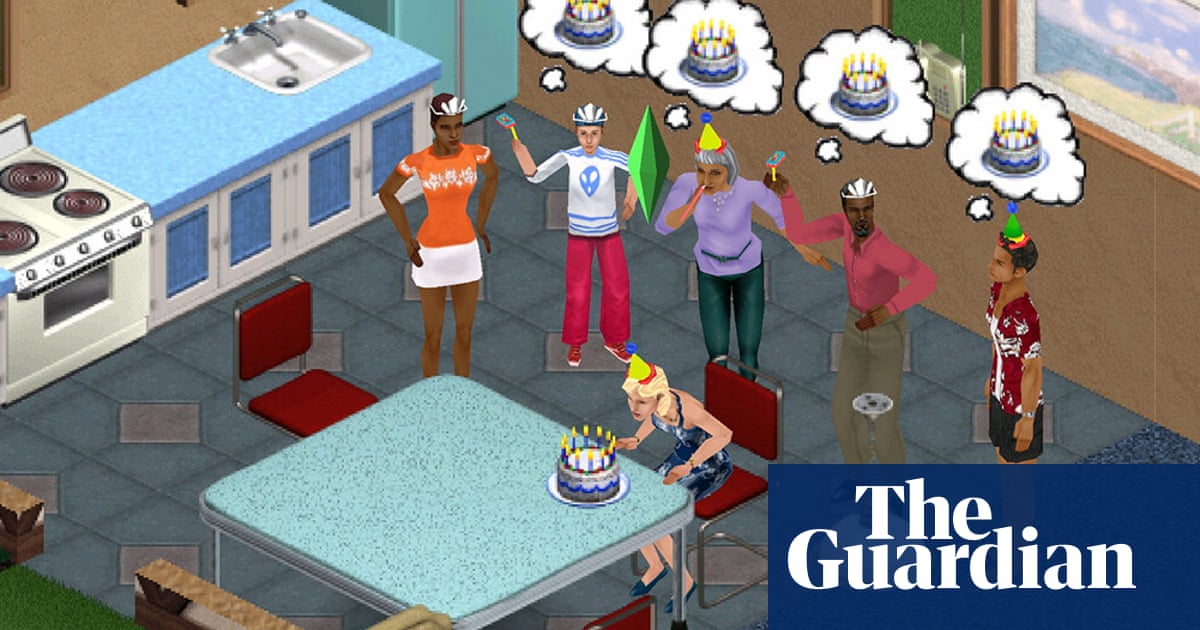When I was growing up, the genre-defining dollhouse sim The Sims was the ultimate escape. I’d build dream homes, cultivate a neighbourhood of weird and wonderful friends and live out a fantasy adult life.
So when EA surprise-dropped a rerelease of The Sims 1 and 2 last weekend to celebrate the series’ 25th anniversary, with all expansions included (my nine-year-old self’s dream) naturally I was compelled to return to my happy place, revisiting my 10-hour pyjama-clad marathon sessions micromanaging the lives of the Newbies, Roomies, and the Goths, and occasionally removing their pool ladders when they were taking a little swim, and only taking a necessary pause for mum’s roast dinner.
While the familiar chaos of breezy music, tragic pool accidents, and my own personal french maid delivered a powerful dose of nostalgia, there is something else lurking beneath this game’s quirky and cheerful exterior, something that I wasn’t conscious of when I was a kid. To my surprise, the game now feels less like a chance to live out your dream life, and more like a struggle simulator. (I also forgot how much time my Sims spent playing chess.) Like a Lynchian picket-fence town, I realised, there’s a darkness lurking under suburban sheen.
The original Sims games were more dystopian than today’s perky, brightly coloured The Sims 4. The Sims 1 instead offers a desaturated daily grind. The contrast isn’t just the aesthetic – 20 years ago, Sims had no dreams or ambitions. Your virtual families worked long hours for expensive lives, where death – and some of the most gut-wrenching music in game history – lurked behind even mundane everyday tasks.
Forget personality, aspirations and tastes. The Sims 1 is a capitalist nightmare where survival trumps self-actualisation.
I forgot how much time the original Sims actually spend working. They do boring, dull jobs for little pay, out of your sight – making the simple message that you get when they are promoted (or passed over) strangely impactful. Put that meagre wage packet towards the cheapest oven on offer, and it’ll probably catch fire and kill you. This is a game that punishes you for being poor. It means that the rich, like the iconic Goth family, in their still-stunning graveyard-edged stone mansion stay, rich – while the poor stay poor. Social mobility in The Sims 1, I learned, is near impossible.
And having a social life? Forget it, at least when you’re on the bottom rung of your random career ladder. There’s simply no time to make friends, something I didn’t remember from my days as a Sims-obsessed tween. I now realise that my neighbourhood’s messy EastEnders-level entanglements were largely scripted in my head. Instead, you must chip away at ++ and – – relationship scores until you can finally, anticlimactically ‘Play in bed,’ thanks to the Livin’ it Up expansion pack that provided the world’s most basic sex education to a generation of 11-year-olds. There’s nothing dark about that expansion’s heart-shaped bed. I still want it in real life.
Even these moments with the most meaningful loves of my Sims’ lives seemed to offer them nothing – they were transactional, serving nothing more than to unlock new interactions. They are performing for my enjoyment, not theirs.
Friendship is also bleakly transactional here: you need a certain number of them to climb the ranks at work. Stay lonely, and you’ll stay poor, and probably die from having a cheap, spontaneously combusting microwave. It’s an especially sad existence for single Sims who live alone. Exhausted from work, if you don’t find time to call your friends on the phone for hours – or they decline to come over – your relationships decay rapidly. Like Black Mirror’s award-winning Nosedive episode, losing social credibility quickly sees things spiral quickly downhill for your Sims.
And nothing flips a millennial’s stomach as quick as the music that heralds a terrifying, sudden burglary. It’s still horrifying 25 years later, so just hope that you had the foresight to spend your meagre savings on a burglar alarm. That’s before we even get into visits from the Grim Reaper, and creepy prank calls. These unexpected callers frighten me just as much now as they did then.
after newsletter promotion
Perhaps my new darker perspective on the game comes from the world we live in now. I’m finally living my fantasy adult life – I just didn’t realise it would be less lounging in gothic-mansion dream homes, and more feeling overworked, underpaid and on the verge of a spiralling breakdown. In 2025, an era of economic anxiety and burnout, the grind of The Sims feels brutal.
For all its existential dread, The Sims 1 is still an escape. Sure, it presents a kind of capitalist nightmare. But, it is a capitalist nightmare you can control. No matter how hard the daily slog got, you can always type in a cheat code and wipe away financial stress with a click – the ultimate fantasy. It’s also weirdly accurate: just like in real life, external advantages (and cheating the system) are way more likely to lead to success than grinding away and following the rules.
Yes, The Sims 1 was and remains a dystopian suburban treadmill, but it also makes room for humour. It’s a world where chaos is funny, failure is temporary, and the worst tragedies could be undone with the click of a mouse.
Article by:Source: Bex April May











